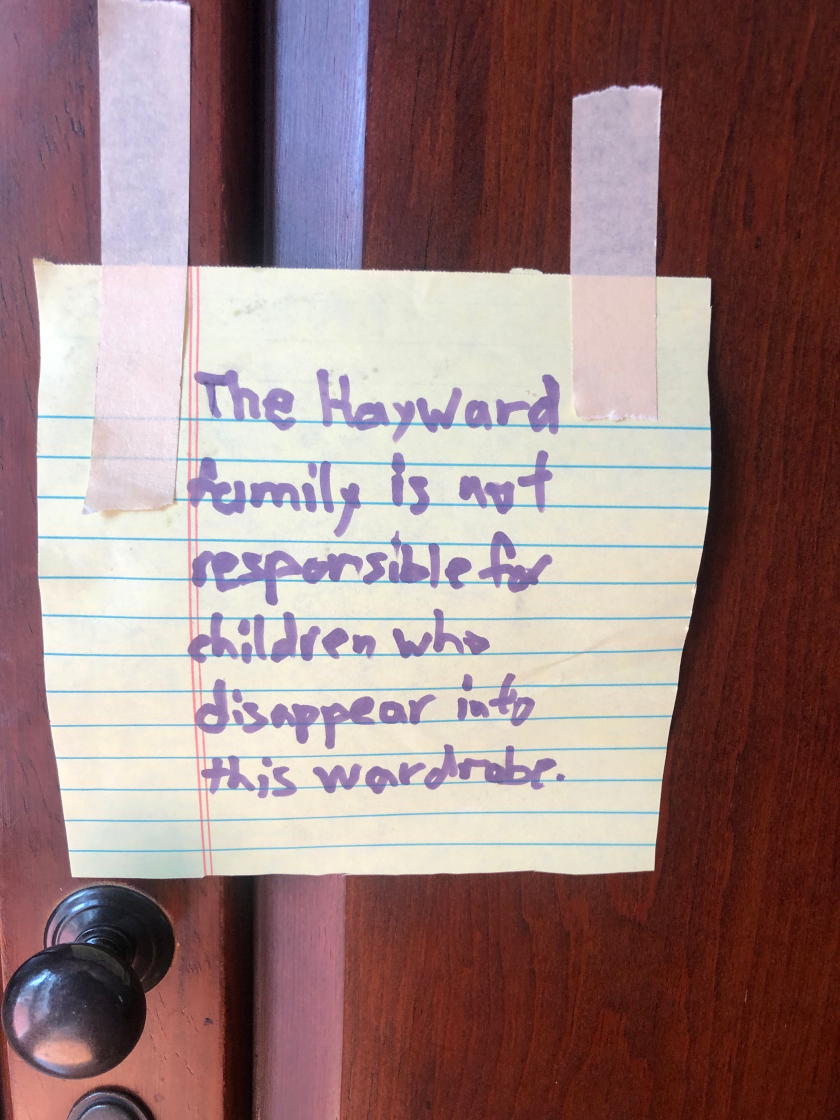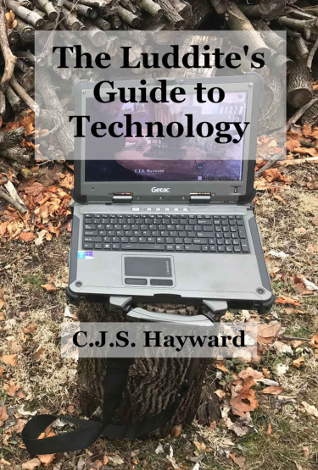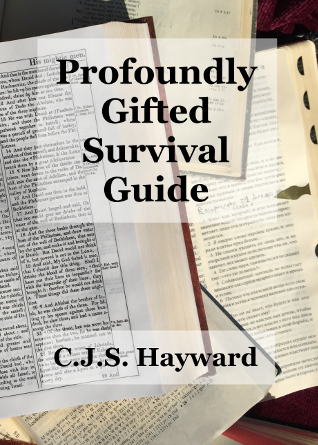(In the C programming language as compiled under gcc, a standard int "counting number" can count up to 2,147,483,647 but if you count that high and add one more, an "integer overflow error" occurs, and the messed-up number is changed to a negative number: -2,147,483,648.)
Tag: Humor
International Obfuscated Python Contest Winner 2022
#!/usr/bin/python3
print("Hello, world!")
My Life's Work
TL;DR
Own my complete collection in paperback! It is well worth it.
OK, so I'm a dwarf standing on giants' shoulders, but...
A life's work between two covers... er, almost a dozen pairs of covers with four to six hundred pages in between... that could nicely adorn about two feet of space on your bookshelf... a little smaller in size than the complete Calvin and Hobbes...
"Must... fight... temptation.... to read... brilliant and interesting stuff from C.J.S. Hayward.... until.... after... work!"
—Kent Nebergall
If you don't know me, my name is Christos Jonathan Seth Hayward, which I usually abbreviate "C.J.S. Hayward."
But my name has to my surprise trilettered on Facebook to "CSH," for "C.S. Hayward". As in, the natural successor to C.S. Lewis. I take that as a big compliment.
I'm an Eastern Orthodox author, who grew up reading C.S. Lewis, and has read almost everything he wrote, including some of those reviewed in C.S. Lewis: The Neglected Works, but have written many different things in many styles. Readers have written things about parts of the the colllection like (J. Morovich):
A collection of joyful, challenging, insightful, intelligent, mirthful and jarring essays written by an Eastern Orthodox author who is much too wise for his years.
and (D. Donovan):
Each piece is a delight: partially because each 'speaks' using a different voice and partly because a diversity of topics and cross-connections between theology and everyday living makes the entire collection a delight to read, packed with unexpected twists, turns, and everyday challenges.
And all this for some of this collection.
These pieces are a joy to read, and a gateway to help you enter a larger world, and open up doors that you never dreamed were there to open. Want to really see how "There are more things in Heaven and earth than are dreamed of in your philosophy?" Read these.
This little library includes nearly everything I’ve written--roughly 365 works in 12 volumes. The works in each volume are quite varied and most are short.) I omit software projects and the occasional interactive webpage. What all is offered? Works in this series include: novellas, short stories, poems and prayers, articles, and humor.
The one single work I would recommend most by far, and has been strongly recommended by others, is The Consolation of Theology. It is based on a classic The Consolation of Philosophy, and it is meant to give consolation, joy, strength, insights and things that are beyond mere insight. In a pandemic, a collapsing economy, and times when grandmas are buying shotguns, and perhaps other things in the pipeline, happiness is possible, in our reach, and it is real.
My story includes Protestant origins and a progressive discovery of Orthodox Christianity. Because this is a collection of the Good, the Bad, and the Ugly, I have set the works I would particularly recommend in bold in the Table of Contents.
I've also dropped the specified price per volume from $29.99 to $19.99.
Buy the C.J.S. Hayward: The Complete Works on Amazon now!
(Please note: In the past, a bug prevented an avid reader furious he couldn't read more than the first half of the Kindle edition. The Kindle edition has one review at one star, from someone who read the first half of the book and was infuriated he couldn't read further. I've since fixed that bug, but the review is live and probably deterring people from purchasing. I can and do write well-received titles.)
- C.J.S. Hayward: The Complete Works: vol. 1
- C.J.S. Hayward: The Complete Works: vol. 2
- C.J.S. Hayward: The Complete Works: vol. 3
- C.J.S. Hayward: The Complete Works: vol. 4
- C.J.S. Hayward: The Complete Works: vol. 5
- C.J.S. Hayward: The Complete Works: vol. 6
- C.J.S. Hayward: The Complete Works: vol. 7
- C.J.S. Hayward: The Complete Works: vol. 8
- C.J.S. Hayward: The Complete Works: vol. 9
- C.J.S. Hayward: The Complete Works: vol. 10
- C.J.S. Hayward: The Complete Works: vol. 11
- Paperback that is built to last, and is printed on acid-free paper.
- Kindle on Amazon, and
- the HTML source,.
You can always just buy the first one. (And maybe buy other volumes one at a time if you like it.)
You want to own this in paper!
I'd also like to make available downloads for cheap or for free, but I have a reason for posting this now. I want to keep my website, which has been online since the end of the 20th century, alive for however long I really can, but there are some things I can't control and I am getting ready, I hope, to visit a monastery. What comes of that I don't know, but I'd really like for you to own my books in paper. And I'm not sure how long it will be until Amazon makes a decision that will render my works no longer available. However, as a complement to the availability of paper books, I have available:
(One note:) I had hoped to make a free download available in Kindle and ePub, as well as an option of spending a few dollars on Amazon. However, one of the latest additions reads:
Dear Reader;
How do I love thee?
Let me count the ways.
integer overflow error at 0x0
And when I tried to convert the text to an ePub to distribute freely, the conversion software errored out saying it had reached maximum recursion depth.
So I have it available in the following formats:
(The last two especially have so much content that they are bulky and incredibly unwieldy. If you'd like to just cut to the chase, read The Luddite's Guide to Technology.)
Enjoy!
Just for Amusement's Sake


T-Shirt: "Orthodox Christian in Communion with CHRIST"
T-Shirt: "Roman Catholic in Communion with the Archdruid of Canterbury"
A Note to the Reader
Hysterical Fiction: A Medievalist Jibe at Disney Princess Videos
From Falstaff to Herodotus, grace: I send your excellence my manuscript, as revised again, and have returned the Imaginarium. I have tried to envision what life was really like in The Setting, but yet also keep things contemporary. Please send my boots and cloak by my nephew.
Here is the story:
Oct 8, 2020, Anytown, USA.
Anna looked at the sky. The position of the sun showed that it was the ninth hour, and from the clouds it looked like about four or five hours until there would be a light rain.
She stood reverently and attentively, pulled out her iPhone, and used a pirated Internet Explorer 6 app to spend deliberate time on social networks: first Facebook, then Twitter, then Amazon. It was the last that offered the richest social interaction.
Technology in that society underscored the sacred and interlocking rhythm of time, with its cycles of lifetime, year, month, and day, right down to the single short hour. But there was a lot of technology, and it had changed things. The road had for ages been shared between pedestrian man and horse. Now, decades after automobiles had taken root, it had to be shared between man, horse, and motorcar. A shiny, dark Ford Ferrari raced by her on the sidewalk. She paused to contemplate its beauty. Then she listened, entranced, as a poor street musician played sad, sad music on an old Honda Accordion.
And in all this she was human. Neither her lord nor she knew how many winters each had passed when they married; neither she nor her lord for that matter knew that it was the twentieth century. She cared for birth and mirth, and she loved her little ones. She did not know how many winters old they were, either. And there was life within her.
And she was intensely religious, and intensely superstitious, so far as to be almost entirely tacit. She knew the stories of the saints, and attended church a few times a year. She lived long under religion's shadow. And her mind was tranquil, unhurried, unworried, and this without the slightest effort to learn Antarctican Mindfulness.
And in all this, she was content. Her family had lived on the same sandlot; more than seven generations had been born, lived, and died without traveling twenty miles from this root. The stones and herbs were family to her as much as men, but this was, again, tacit.
She was human. Really and truly human, no matter what others thought the epoch was.
Then a crow crowed. She looked around, thoughtfully. It was well nigh time to visit her sister.
"But how to get there?" she thought, and then, "I have walked in the opposite direction, and she will be upset if I am even two or three hours late."
Then a solution occurred to her. She reached into her pocket, pulled out her new iPhone Pro, pulled up the Uber app, and ordered a shared helicopter ride.
Beware of Geeks Bearing Gifts
Why did we call ourselves the Katana? It was in the excitement of a moment, and a recognition that our project has some off the elegance of a Katana to a Japan fan. We were more current than today's fashions and for that matter made today's fashions, but representing an unbroken tradition since Plato's most famous work, what they call the world's oldest, longest, least funny, and least intentional political joke: The Republic. Things would have been a lot easier if it weren't for them. They obstructed the Katana.
The Katana have a dynamic thousand-or-so goals, but there is only one that counts: the relentless improvement of the Herd. Some of the older victories have really been improving agriculture what seems like thirty, sixty, or a hundredfold, with mechanized engineering for farming and a realization that you can have meat costing scarcely more than vegetables if you optimize animals like you'd optimize any other machine, under conditions that turn out to be torture for farm animals. There are some lands where the Herd has been imbued with enough progress that the middle class has about as many creature comfort as there is to be had, and for that matter among the poor the #1 dietary problem is obesity. Maybe we made the Herd look more like pigs, but please do not blame us! We aren't eating that much!
And we are altruists through and through.
We have been providing the Herd with progressively greater "space-conquering technologies", as they are sold, which neuter the significance of their having physical bodies and the structure of life that was there before us. First we gave gasoline-powered Locomotives and great Aerobirds, devices that could move the meat of the human body faster. Now we are unfolding another wave of body-conquering technologies, which obviate the need to move meat. They are powered by a kind of unnatural living thing. Perhaps the present central offering in this horn of plenty, or what we present as a horn of plenty, is a Portal: a small device carried by many even in the poorest lands, that draws attention to itself and such stimulation it offers, disengaging from ancient patterns of life.
Things would be so much easier if it weren't for them. We tried to tell people that they hate women; now we've told people that they hate gays. They still get in the way of progress.
Yesterday there was a planned teleconference, a town hall among the Katana after an important document from them had been intercepted. It was encrypted with a flawed algorithm, but cryptanalysis is easy and semantics is hard, and we gave the document to the semanticians for analysis.
The title of the document was straightforward and one that the Katana was happy to see: "How to Serve Man". But the head semantician came late, and his face was absolutely ashen. It took him some time to compose himself, until he said—"The book... How to Serve... How to Serve Man... It doesn't contain one single recipe!"
[With apologies to Damon Knight, To Serve Man.]
IQ Test Fail
Me: How many Exxon captains does it to make an oil spill?
Psychologist administering test: How many?
Me: One and a fifth.
Psychologist (puzzled): I get the joke...
But why the fifth?
He wasn't making witty repartée!









